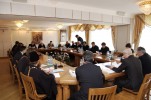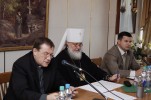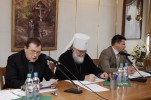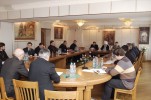Christian Interconfessional Consultative Committee of the CIS and Baltic countries resumes its work
2.10.2008 · Архив 2005-2009, События
The Christian Interconfessional Consultative Committee of the CIS and Baltic countries resumed its work in the Moscow Patriarchate Pilgrim’s Centre on 2 October 2008 on the theme ‘Christianity in the Modern World: National and Universal.’
The Christian Interconfessional Consultative Committee is co-chaired by the chairman of the Moscow Patriarchate Department for External Church Relations Metropolitan Kirill of Smolensk and Kaliningrad, the head of the Roman Catholic Archdiocese of the Mother of God in Moscow archbishop Paolo Pezzi, and the chairman of the Department for External Church Relations of the Russian Union of the Evangelical Christians Baptists Rev. Vitaly Vlasenko.
While greeting the participants, Metropolitan Kirill noted that people calling themselves the followers of Christ and bound by common history are living in different stated in which different national identity is being shaped.’ Moreover, the Orthodox, Catholic and Protestants have their brethren of the same faith in all corners of the world, and these people live in the states with different interests. ‘That is why it is necessary to always match the national and the universal in practical pastoral activity and theology,’ Metropolitan Kirill underscored.
He is convinced that nothing separates people more than the shed blood, and the August events in the Caucasus bear clear testimony to it. The two Orthodox peoples, namely the Georgians and the Ossetians, have lived in peace for a long time, though their vision of history and the future was different. Now they are separated by blood and sufferings. Yet, the believers still have the Gospel categorical imperative, which is the Saviour’s call to unity and peace.
‘It is necessary to remember that we all are citizens of the heavenly Fatherland for, according to St. Paul, ‘here we have no lasting city, but we are looking for the city that is to come.’ (Heb 13:14). Orthodoxy has always been aware of the fact that government, states and even nations come and go, while the Church remains. Eternal life is most important to Christians who should be able to regard their earthly interests as secondary, as the main thing to them is their aspiration for the Heavenly Kingdom with its new heaven and new earth (cf. Rev 21:1) where no national and state borders exists,’ Metropolitan Kirill continued.
He is convinced that Christians should not be indifferent to the sufferings, cares and needs of their neighbours. ‘Patriotism is inherent in Christians as love to their neighbour, their families and their church community. Though love cannot be limited by family, and Christians love their native country and their own people. Therefore, Christians should not be afraid of the word ‘patriotism.’ It fits well into Christian vocabulary.’
He thinks that Christians should maintain relations even despite conflicts between states accompanied not only by military confrontation but also by information wars. For instance, after the Russian Orthodox Church had petitioned before military authorities, His Holiness and Beatitude Patriarch-Catholicos of All Georgia Iliya II visited the city of Gori and met with the locals and Russian soldiers there.
The Moscow Patriarchate initiated a visit of the delegations of the World Council of Churches to Georgia, South Ossetia and Russia and international Christian humanitarian aid to both sided suffered during the conflict.
In conclusion of his address Metropolitan Kirill said that the Lord had called Christians to reconcile people and should strive for their unity and for life in peace.
The participants discussed future activities of the Christian Interconfessional Consultative Committee of the CIS and |Baltic countries and made a statement on the result of the meeting.
The Committee was set up on the4 initiative of the Russian Orthodox Church in 1993 to develop cooperation among Christians in the post-Soviet space – In Russian and the CIS and Baltic countries. The Committee held three major interconfessional conferences in 1994, 1996 and 1999 and the Christian Interconfessional Youth Conference on ‘Christianity in the Third Millennium’ in 2001.
The Committee suspended its work in 2002 because of the difficulties in interconfessional relations. Yet in 2007, representatives of Christians Churches and communities of the CIS and Baltic countries meeting on the eve of the 3rd European Interchristian Assembly put forward an initiative to resume its work.




